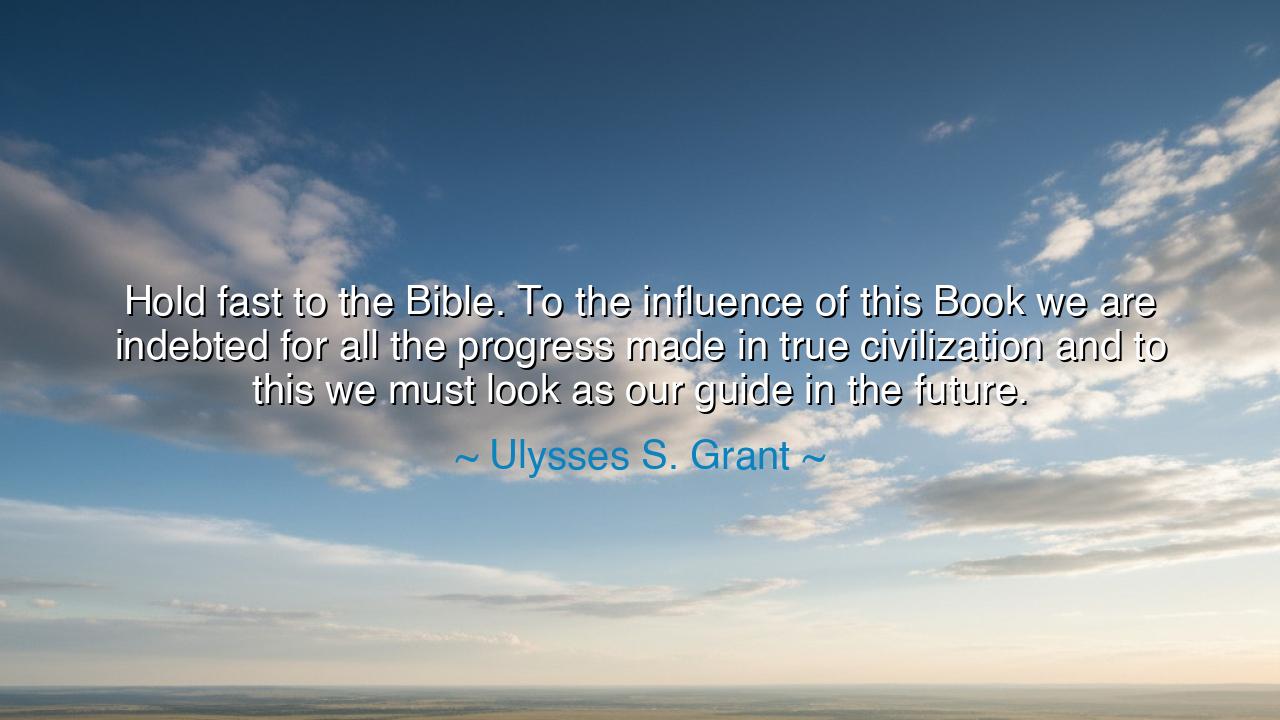
Hold fast to the Bible. To the influence of this Book we are
Hold fast to the Bible. To the influence of this Book we are indebted for all the progress made in true civilization and to this we must look as our guide in the future.






In the grand tapestry of human civilization, there are few threads as powerful and enduring as the Bible. Ulysses S. Grant, a man who witnessed the trials and triumphs of a nation torn by civil war, spoke with conviction when he declared, "Hold fast to the Bible. To the influence of this Book we are indebted for all the progress made in true civilization and to this we must look as our guide in the future." These words, reverberating through the halls of history, remind us that the foundation of true civilization is not built merely on material progress or power, but on the enduring wisdom found within the sacred pages of the Bible. Grant's call to hold fast to the Bible is not just a plea for religious devotion but a recognition of the guiding principles that have shaped the course of human history.
The ancients understood the profound power of sacred texts to shape the morals and values of society. In ancient Egypt, the Book of the Dead guided the souls of the deceased and set forth a moral code for living. In ancient Greece, the philosophers often turned to the wisdom of the gods to understand the principles of justice, honor, and virtue. In Rome, the Twelve Tables provided a foundation for law and order, while the teachings of Cicero called on the people to live by the natural laws of morality. These ancient texts, like the Bible, offered guidance for individuals and nations, shaping the very essence of what it meant to live a virtuous and just life.
Similarly, Christianity, through the Bible, brought a new wave of morality and civility that transcended the ancient world. The Sermon on the Mount, for instance, taught principles of compassion, forgiveness, and love for one's neighbor—values that continue to echo through the corridors of history. It was from these teachings that the foundations of modern democracy and justice were laid. The Bible became not just a religious text, but a moral compass for shaping societies and governments, guiding them toward principles of equality, justice, and human dignity.
One of the most profound examples of the Bible’s influence on civilization can be seen in the life of William Wilberforce, the British politician and reformer who led the charge against the slave trade in the 18th and 19th centuries. Wilberforce was deeply moved by his Christian faith and the teachings of the Bible, which he saw as calling him to fight for the freedom and dignity of the enslaved. His relentless efforts, guided by the moral compass of the Bible, ultimately led to the passing of the Slave Trade Act of 1807, a key turning point in the abolition of slavery in Britain. Wilberforce’s life is a testament to the power of the Bible to shape both the conscience of an individual and the moral direction of an entire nation.
In the American context, Ulysses S. Grant himself understood the moral and spiritual power of the Bible, especially during the dark days of the Civil War. He witnessed firsthand the devastating effects of division, hatred, and injustice. Yet, it was also in these times of struggle that the Bible’s message of reconciliation, peace, and unity provided hope and direction. The Bible, in its teachings of love, forgiveness, and moral duty, helped to guide the nation through its most difficult period. Grant’s words reflect a deep recognition that the moral fabric of society is sustained not merely by laws and governments, but by the guiding principles of compassion and justice found in the Bible.
The lesson that Grant imparts is clear: true civilization is built upon more than just physical achievements or political power; it is grounded in the moral and spiritual guidance that has been passed down through the ages. The Bible’s influence has been the bedrock of human progress—shaping laws, guiding leaders, and providing hope to millions. To hold fast to the Bible is to hold fast to the very principles that have uplifted humanity throughout history. It is a call to live by a higher standard, one that transcends the fleeting nature of earthly power and status.
In our own lives, we must ask ourselves: what guides our decisions, our actions, and our relationships with others? Is it the shifting winds of public opinion, or is it the enduring wisdom of the Bible? As individuals and as a society, we must return to the principles of love, justice, and mercy that the Bible teaches. In times of turmoil, it is these principles that will see us through. Let us look to the Bible not only as a spiritual text but as a moral compass that can guide us toward a future built on the true values of civilization. In doing so, we will honor the past, strengthen the present, and lay the foundation for a future of justice, peace, and human dignity.






AAdministratorAdministrator
Welcome, honored guests. Please leave a comment, we will respond soon